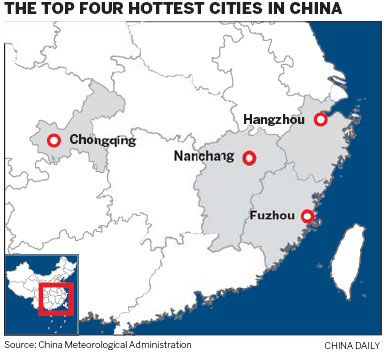Usual suspects not on hot cities list
By Wang Qian in Beijing, Xu Wei in Chongqing and Cang Wei in Nanjing (China Daily) Updated: 2012-08-20 07:20Ranking arrived at using weather data collected from 1981 to 2011
Among the places that are popularly considered the hottest in China, a couple were absent from a list of the country's "hotpot cities" that the country's climate watchdog released for the first time over the weekend.
 |
|
A resident in Chongqing jumps into a swimming pool in the Yangrenjie water amusement park on Saturday, when the temperature in the city exceeded 40 C. Chen Cheng / Xinhua |
Chongqing and Hangzhou, both notorious broilers during the summer months, made the list. But Wuhan and Nanjing, which are also commonly believed to be among China's hottest cities, were absent from the top four spots in the ranking.
Unsurprisingly, also high on the list were Fuzhou in East China's Fujian province and Nanchang in Jiangxi province, according to the China Meteorological Administration's National Climate Center, which compiled the list.
Rather than simple measurements of heat, the rankings were calculated using a "heat index", which combines temperature and humidity data collected from 1981 to 2011 in an attempt to get a sense of how hot the weather over a certain period actually feels to human beings, the center said.
|
 |
"Greater humidity will prevent heat from being dissipated from the human body as quickly, causing a sensation of being overheated," said Zhang Cunjie, a climate expert at the center. "Dryness, on the other hand, can accelerate heat loss from the body."
Zhang said global warming and the "urban heat island effect" - the effect buildings, pavement and other features of urban landscapes have on the temperature - have helped push the mercury in thermometers up higher in recent summers.
In July, Chongqing saw 25 days in which the high temperature surpassed 35 C, according to the city's meteorological bureau. Forty-eight people in the city suffered heatstroke from the start of April to Thursday, the local health bureau said.
Dong Xinning, a senior meteorologist at the Chongqing Meteorological Bureau, said extremely hot weather has become more common in recent years. He said the National Climate Center's rankings come as a sign that he and other officials need to prepare for future possible heat waves in Chongqing in order to prevent economic losses and casualties.
Heat alerts have been common this August, prompting city residents to find various ways to keep cool.
Liu Hongcen, a 30-year-old woman in Chongqing, said the heat led her to ask her retired parents to keep her 5-year-old daughter in Guizhou province's Tongzi county, about two hours' drive away from Chongqing, while schools are closed for the summer.
"For the past five years, my parents have taken my daughter there for the summer," Liu said. "The temperature in Tongzi is comfortable (ranging from 20 to 30 C) during the summer."
Lin Jing, a staff member at the Caribbean Water Park in Chongqing, said the park has received more guests this summer than in any other season since it opened in 2009. Nearly 15,000 people a day have visited during the hot season this year, 50 percent more than the 10,000 it is designed to accommodate.
In early August, the Chongqing Meteorological Bureau issued at least seven heat alerts to warn the public of approaching hot weather.
Elsewhere, Wuhan, capital of Hubei province, and Nanjing, capital of Jiangsu province, are both popularly considered to be among the hottest places in China but have actually seen fewer heat waves in recent years, experts said.
Chen Zhenghong, a researcher at the Hubei Meteorological Bureau, said global warming is causing changes in the way air circulates, resulting in heat waves that move from the south of China to the north.
Zhang said temperatures in North China, including those in Beijing and Shijiazhuang, Hebei province, are rising faster than those in the south.
Many residents in Nanjing say this summer has been a bad one, even though their city was not listed at the top of the hotpot ranking.
Zhou Wei, 57, a Nanjing resident, said the city may not be the hottest place to be in the country but residents there still suffer from humidity that makes them feel as if they are in a sauna all day long.
Tang Xianlian, a street cleaner in Nanjing's Baixia district, said the weather has been worse for outdoor workers this summer, noting that "the ground temperature is above 40 C".
Contact the writers at wangqian@chinadaily.com.cn, xuwei@chinadaily.com.cn and cangwei@chinadaily.com.cn
- 3 years in jail for online rumors
- Guangdong strike reveals issues
- Students use hugs to ease Sino-Japanese tensions
- Regional pollution affects Beijing
- Farmer seeks answers from Apple for wife's death
- Desalted seawater to quench Beijing's thirst
- Cancer remains No 1 killer in Beijing for 7th year
- Govt to give better access to drugs
- City admits to problems in water
- Headmaster sacked over child molestation







